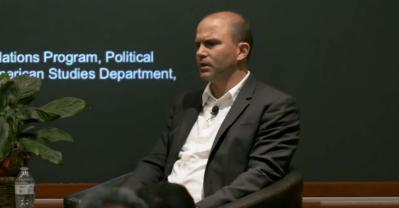What Is History?
The History curriculum at LMU emphasizes the potential for human action, showing how an individual’s ideas and decisions can change the world even as historians examine the broader social, political, and cultural contexts that make individual choices possible and influential. Historical perspective provides insight into the sequence of events, the interconnections among peoples and societies, and the dynamism of structures and beliefs that can otherwise appear natural, fixed, or predetermined. As History majors, you learn to examine evidence, select relevant materials, search for causes and effects, and formulate conclusions. You acquire extremely adaptable skills, graduating with the abilities to reason, learn, and communicate that are so highly valued in the modern economy.
What Do History Majors Do?
As History students at LMU, you engage with the past in many different ways. You can study a broad range of times and places through the Generalist Track, or you can focus in on a specific theme by choosing one of the five concentrations in our Specialist Track: Public and Applied History; Law, Politics, and Society; Global Economies, Encounters, and Exchange; Race, Gender, and Culture; and Environment, Science, and Technology. You can also engage the past public history projects, exhibitions, website design, research programs and presentations, academic events, study abroad, and international immersion courses. You will develop critical thinking skills and an understanding of events, processes, and patterns in the human experience. As History students, you gain perspective, understanding how your lives relate to a larger historical process as you study historical methods, sources, and competing interpretations. As History students, you learn the research and analytical skills used in interpreting the past, such as criticism of sources, the definition of historical questions, comparative analysis, and the diverse perspectives of participants in history. You craft arguments about historical change, and analyze the factors that cause such change on local, national, and global scales. As History majors, you learn to appreciate historiography, the changing nature of historical explanation itself.
LMU's location in historically rich Los Angeles offers a further advantage through research opportunities in local archives, film collections, and presidential libraries, while the History Department’s faculty connect students with national and international resources and connections. Prepared with knowledge and eloquence, you will graduate particularly well suited to go into media, education, law, research, and related fields, but you can move into any career.
Is This Major Right For You?
You might be a History major if you:
- Are curious about the past
- Enjoy researching, reading, and writing
- Have broad intellectual interests
- Wish to participate in public service
- Appreciate different ways of seeing the world
About Our Faculty
Our faculty reflects the international diversity of Southern California. They received their degrees from top research universities; they are productive scholars who serve on national boards; and their teaching and research have earned numerous fellowships, grants, and honors. They bring this scholarly experience and energy into the classroom through challenging and innovative teaching.
Recent faculty publications include: Nigel Raab, All Shook Up: The Shifting Soviet Response to Catastrophe 1917-1991 (McGill-Queen's University Press, 2017); Cara Anzilotti, She-Devil in the City of Angels: Gender, Violence, and the Hattie Woolsteen Murder Case in Victorian Era Los Angeles (Praeger, 2016); Kevin McDonald, Pirates, Merchants, Settlers, and Slaves: Colonial America and the Indo-Atlantic World (University of California Press, 2015); Nicolas Rosenthal, Reimagining Indian Country: Native American Migration and Identity in Twentieth-Century Los Angeles (University of North Carolina Press, 2013); Amy Woodson-Boulton, Transformative Beauty: Art Museums in Industrial Britain (Stanford University Press, 2012); and Carla Bittel, Mary Putnam Jacobi and the Politics of Medicine in Nineteenth-Century America (University of North Carolina Press, 2012).
About Our Courses
Our courses include:
- First Year Seminar: Art and Power
- First Year Seminar: Bystanders during the Holocaust
- First Year Seminar: Imagining Lincoln
- First Year Seminar: The Making of a Global Los Angeles
- First Year Seminar: Natural Catastrophes in Historical Perspective
- First Year Seminar: Oceans and Empires
- First Year Seminar: People and the Environment
- First Year Seminar: The Politics of the Veil
- First Year Seminar: The Year 1000
- Science, Nature, and Society in the West
- Telling History in Public
- Crime Stories: Morality, Deviance, and Popular Culture in Modern Britain
- Culture and Politics of Weimar Germany
- A History of Russian Foreign Policy
- Religion and US Political History
- US Environmental History
- Latin American Revolutions in Film
- Environment and Economy in Modern China
- Pirates and Piracy
- Global History of Food
- The Viking World
- Nazi Germany
- The Civil War
- The Politics and Culture of the Cold War
- The American West
- History of California
- American Reform Movements
- Health and Disease in American Culture
- Hollywood and History
- The Palestine/Israel Conflict
- Early Mexico
- Modern China
- Topics in Public History
